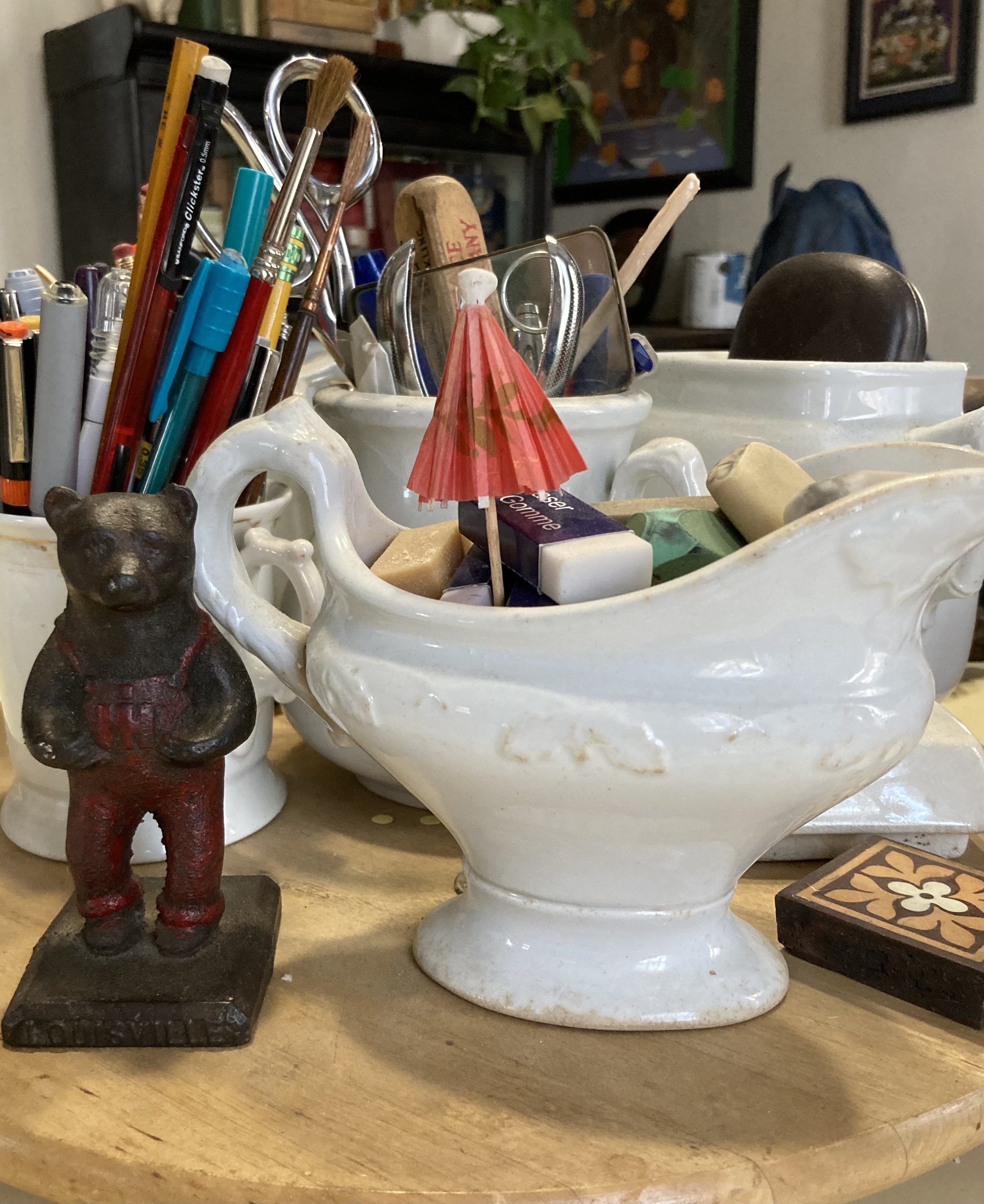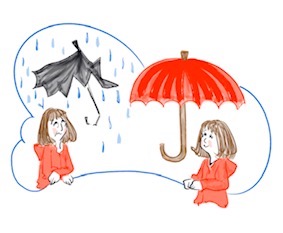LOAVES AND FISHES
“Loaves and fishes” – a useful metaphor for miracles springing from small beginnings. Jesus used a boy’s lunch – five loaves and two fishes – to feed five thousand famished souls, then had His disciples gather up the leftovers.
I have my own loaf-and-fish stories, and I keep the leftovers – a tiny paper umbrella, a battered raincoat, a desk. Here are the stories behind them:

When I was facing life at fifty with no job, no house, and seemingly, no future, I held onto this vision: a bent and broken black umbrella, moving from over my head, being replaced by a big, red, leather umbrella with an oak handle. Years later, relatively prosperous, remarried and on my honeymoon, I told Marvin this story as we walked to dinner. He bent over, grabbed an object off the sidewalk and handed it to me: a tiny red umbrella. A gift of confirmation and love, a little miracle.
- Attending a new Bible study for the first time, and feeling out of my depth, I was encouraged by Patty, sitting next to me and wearing the EXACT SAME jacket I was wearing. Same size, same color, same label. Add to this the fact that I bought mine second-hand, in another state, twenty years before. I was encouraged; I felt maybe I belonged. That group has become a mainstay for me, and for Marvin.
- On a sentimental journey to New Jersey, I pulled into the parking lot of my dad’s old workplace, Radio Frequency Labs. Stood looking at the odd, Quonset-style WWII architecture, a fond memory from when I was wee-little, picking Daddy up from work, and later, from working there myself, one summer after high school.A woman crossing the lot hailed me; I introduced myself, a tour and a conversation ensued. Turns out, her husband had frankly idolized my father, and had saved his drafting table when the company sold outdated equipment at auction. It sat, disassembled, in his basement. He gave it to me; I carted it home in the back of my minivan. I’m sitting at it now. I draw at the desk my dad used for drawing. To this day, it’s a directional pointer for my career.

Oh, please, Mary, I can hear you thinking. Yours are not raise-the-dead, feed-the-multitudes, part-the-Red-Sea, miracles; they are nice stories you’ve spun into miracles by choosing how you frame them. Actually, I’m tempted to think that way myself. Because there’s clearly an alternate, non-divine way to see each of my examples. That’s the thing.
We all think we’d be transformed by the right miracle being dropped into our lap at the right time – a lottery win, a love-at-first-sighting, an audible voice from heaven. We think, well, if THAT happened, I’d know for sure that I’d be secure, that I’d be loved, that God is real.
No, you wouldn’t, and neither would I. We humans have the ability to talk ourselves out of almost anything. When God parted the Red Sea for the Israelites, it wasn’t more than a week before the same people who had seen one of the most conclusive miracles of all time began complaining that God had brought them out of Egypt just so He could kill them. They demonstrated a remarkable ability to forget miracles – not just the Red Sea, but let’s add in the daily manna and the pillars of cloud and of fire that guided them day and night. They chose to build a narrative of complaints out of their manifest collection of miracles. Go figure. Jesus famously said even raising the dead would not inspire belief in some hearts. He also said there would be people who did signs and mighty works in His name, yet He’d have to tell them to depart from Him, He never knew them. He wasn’t impressed by miracles, but by the faith of those who trusted Him.
So I save the souvenirs of my little miracles, reminding myself they ARE miracles. There’s another precedent for my keeping: God had the Israelites keep some manna and Aaron’s rod and the Ten Commandments in a box, deep in the holiest of places, tangible reminders of His care.
If we don’t cultivate a mindset to recognize and remember miracles, we forget them or dismiss them with a shrug. We don’t pause and ponder what might be required of us: wonder? courage? great faith?
When Jesus fed thousands with a few loaves and fishes, the meal wasn’t the point. The point – although the lunch was a good thing – the point was that God provides. It was a point meant to guide the disciples into lives of trusting Him at every juncture. The disciples, characteristically, didn’t get the point.
Jesus expected the disciples to remember the loaves and fishes the next time they were in a bind, and to live with this mental posture: if God took care of me once, He’ll do it again. The point of miracles isn’t to persuade us God is real, any more than the point of buying a lottery ticket is to forge a career plan. The miracle is a signpost at a crucial intersection, a compass when we’re lost in the woods. I believe Him, not because of the miracles, but because of what they say about the Miracle Worker. If we’re canny, we’ll use the miracle not only as a signpost, but as a reminder of Who put it there. A miracle is a compass pointing to True North, Him.
Everybody Jesus raised from the dead went ahead and died later. Everybody Jesus healed had challenges to face, later. The fact that a miracle got them out of the soup once didn’t save them from another pot of soup later on. Yet in the midst of life’s messes, miracles drop. Unexpected, serendipitous, sometimes spontaneous, sometimes hard-sought, there they are. We’re wise to pay attention, and to save our souvenirs.
Keep your eyes, and your heart, open.
As always, thank you so much for reading.
Click here to subscribe.
